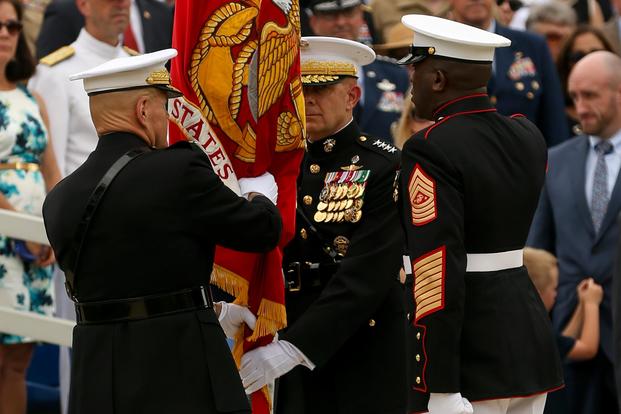The Marine Corps must continue to modernize, train better, and recruit and retain the very best, the new commandant said shortly after taking the helm of the service Thursday.
Gen. David Berger received his fourth star and became the 38th commandant of the Marine Corps during a ceremony at the historic Marine Barracks Washington. Acting Defense Secretary Mark Esper, members of Congress and Medal of Honor recipient retired Marine Col. Harvey Barnum Jr. were in attendance. Berger's wife, Donna, and their four sons -- two of whom are Marines -- also looked on.
Berger told Military.com in an exclusive interview this week that he is humbled and proud not only to become the next commandant, but to continue serving among Marines. For those who know him, there should be no surprises in the leadership style he'll bring to his new role.
"I'm a glass-half-full positive guy," Berger said. "I never stop listening -- sincerely listening."
Related content:
- New Commandant Says He’d Consider a Smaller Marine Corps as Requirements Change
- New Marine Commandant: There Will 'Definitely' Be More Coed Companies at Boot Camp
- The 'Unflappable' Warrior-Scholar: Meet Your Next Marine Corps Commandant
His biggest challenge as commandant will likely be keeping up with the Marines he'll lead, he said, who are pushing to adapt to a rapidly changing environment full of new threats.
"I'm very excited about the Marine Corps and where we're going," Berger said. "I [don't] stay up all night worried about the Marine Corps or the world in front of us."
No Marine knows where their career will take them, Berger said. As a second lieutenant straight out of The Basic School who was joining up with 3rd Battalion, 7th Marines, he said it would've been hard to picture standing on the parade deck becoming commandant, especially since the first time he joined his new unit, he missed a step getting into a vehicle and fell flat on his back.
"Getting out to your first unit where there were actual Marines, that was a pretty exciting and overwhelming week for me ... and I fall like a turtle," Berger said. "I can't get up; I'm just lying on my back. The platoon sergeant is looking at me, my staff sergeant is saying, 'Sir, that's the worst possible thing you could've done on Day 1.'"
Berger said he quickly learned that if you're humble, can laugh at yourself and gain the confidence of your Marines, you're welcomed into the crowd.
He credits his parents, family, mentors and staff noncommissioned officers with getting him to the position he assumed Thursday. He said he plans to continue several efforts started by one of those mentors, outgoing Commandant Gen. Robert Neller, who retired after 45 years of service.
"The recognition from Gen. Neller, and I'm paraphrasing a bit, but that we are not organized, trained and equipped for what we will need to do in the future, I think is absolutely spot on," Berger said. "... His acknowledgment and recognition of the need to start to turn the Marine Corps in a certain direction is absolutely timely and needs to continue."
The Neller Legacy
Neller, who led Marines in Somalia, Panama, Bosnia and Iraq, was born to lead Marines, Esper told the crowd during the Passage of Command ceremony. With his direct and personal leadership style, the 37th commandant led the service through what the acting defense secretary called a "critical inflection point" that transformed the Corps.
"From its counterinsurgency operations that have dominated the last 18 years to a renewed emphasis on high-intensity conflict against great-power competitors," Esper said, "he spearheaded efforts to modernize how the Marine Corps organizes, trains and equips for future conflict, ensuring the men and women of the Corps are prepared to fight and succeed on the battlefield."
Neller, who's headed to Texas with his wife, D'Arcy, where the two will spend time with their grandkids, said he felt a mix of emotions ahead of the ceremony. He, too, recalled a moment as a young lieutenant when his leaders gave him another chance after he accidentally lit Range 2 at Camp Hansen in Okinawa, Japan, on fire.
"We burned down a whole range, and I thought I was watching something else burn as the flames worked their way all the way to the top of the ridge," Neller said. "... For whatever reason -- divine intervention or pity or just general disdain for my ability -- I got to walk away and continue to serve and lead Marines."
Neller led experimentation efforts that changed the way Marines organize, down to the squad level. That initiative led to Marines deploying with new high-tech gear he hopes will help the service keep its edge on the battlefield. He also led the Marine Corps as women began joining infantry and other combat units, and he shook up long-standing fitness standards.
Still, he regrets that change didn't always come as fast as he would've liked to have seen. He also acknowledged some of the cultural challenges he faced, perhaps the biggest being the Marines United scandal, in which active-duty personnel and veterans were caught sharing nude photos of their female colleagues online without permission.
"I regret that sometimes we may not meet the mark as a Marine Corps, but that's a small number of us," Neller said. "And I regret anytime I've failed because any failing of our Corps resides with me and all the success goes to the Marines."
Marines must remain focused as they face new threats from near-peer adversaries.
"We've got to get ready for that next fight," Neller said. "... It's going to be very different against somebody who's certainly, in many ways, as capable if not more capable than us, if it comes to that. Hopefully, it won't, but we can't count on that. Our course of action is not hope; it's be prepared."
'My Job Is to Support You'
Berger told Military.com he'll meet with his senior leaders this week to discuss his vision for the Marine Corps and hear what's on their minds. He wants their feedback "right up front," he said.
"All of us are taught pretty early on to have some pretty firm ideas on where you want to go, but leave room for their organization to help you see things that might not be on your mind," Berger added. "So, I'll intentionally leave a quarter or a third for other leaders to tell me, 'OK, we need to fix this.'"
Marines can expect his guidance to be released soon but, for now, Berger said Marines are on the right track with new force-on-force training and other experimentation efforts meant to better prepare them for taking on a highly competitive enemy should a fight emerge with a country such as Russia, China or Iran.
Berger said he's prepared to look at potential personnel cuts to make sure the Marine Corps is the world's most lethal, well-trained force. That doesn't mean that he's interested in putting equipment before Marines though, he stressed. People are the Marine Corps' most valuable asset, he said.
"It's not airplanes, it's not trucks. It's people," he said. "That has to remain at the very center -- who we recruit and who we retain."
In a short video message to the force Thursday, Berger reiterated that sentiment.
"I think it's my job to support you, to listen to you, and I'm very confident that you know what you need to do," he told Marines.
Two of the Marines Berger listens to are his own sons, who he said have cut their own paths in the Corps and help him see things through a different lens.
"They don't let me get up in the clouds very much," he said. "They keep your feet on the ground."
-- Gina Harkins can be reached at gina.harkins@military.com. Follow her on Twitter @ginaaharkins.













